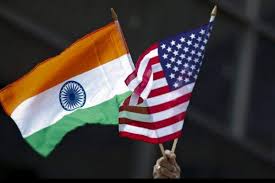What is the purpose of this MoU?
On December 02, 2020, the Department for Promotion of Industry and Internal Trade (DPIIT), Ministry of Commerce and Industry and the Department of Commerce of United States of America, United States Patent and Trademark Office signed a Memorandum of Understanding on Intellectual Property cooperation. The ceremony took place virtually where Mr. Guruprasad Mohapatra, Secretary, DPIIT (on behalf of the Indian Government) and Director Andrei Iancu, Director of the United States Patent and Trademark Office (on behalf of the United States Government) signed the Agreement. 
[Image Source: newindiaexpress.com]
This Agreement would replace the earlier MoU signed between India and the U.S., which expired nine years ago. It is seen as a step to strengthen the relations between the two nations, along with facilitating Intellectual Property cooperation amongst them, to ensure protection rights in both the markets. The purpose of this MoU, as stated by Director Iancu, is twofold- substantive and administrative. Substantively, the Agreement seeks to build capacity in various areas of Intellectual Property such as trademark, copyright, geographical indications, and patents. Administratively, the Agreement wish to exchange experiences and ideas with respect to managing the operations of the Intellectual Property offices to enhance their productivity and efficiency. Director Iancu stressed the importance of this MoU in these challenging times we are facing, expressing that this MoU would facilitate the discovery of solutions required for this global challenge by providing a stronger Intellectual Property rights foundation.
Why is it important for us?
The approval for the MoU was given by the Union Cabinet earlier this year, on February 19, 2020. The highlights of the MoU, aimed at furthering the objectives of the National Intellectual Property Right Policy, 2016, are the following:
- Facilitation of information and knowledge on IP among universities, industry, SMEs, and Research Organizations for best practices and experience. This is to be done by their participation in events which are organized by the Participants.
- Collaboration in other various activities such as training programs, technical exchanges, exchange of experts, and other outreach activities.
- Along with protection, enforcement, and use of IP rights, the MoU also provides for the exchange of information and best practices with respect to the process of registration and examination of IP applications (including patent, trademark, copyright, industrial designs, and geographical indications).
- It also encourages the exchange of information on automation and modernization projects, new information and documentation systems in IP, and other procedures for IP office management.
- MoU encourages cooperation between the two nations to understand issues with respect to traditional knowledge, exchange best practices, raising awareness about traditional knowledge and the use of existing IP systems for the protection of traditional knowledge.
- The MoU also enables the Participants to mutually decide other cooperation activities as they deem fit.
How would it be implemented?
Both the nations are required to draw up a Biennial Work Plan so as to implement this MoU, which will expressly state the detailed plan for carrying out the agreed cooperation activities.
Author: Sanjhi Sharma, an intern at Khurana & Khurana, Advocates and IP Attorneys. In case of any queries please contact/write back to us at aishani@khuranaandkhurana.com.



